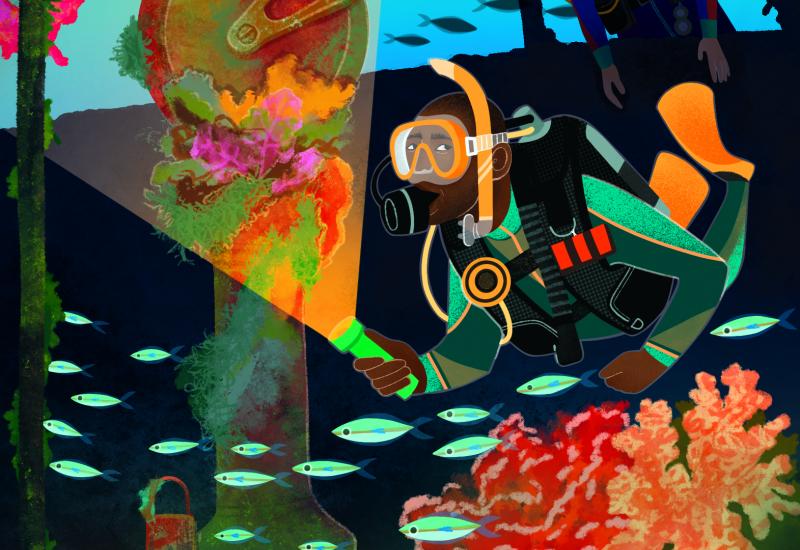Eight Safe-Travel Tips Every Diver Should Know
The primary objective of every dive is to get back safely—the same is true for your whole vacation. Knowing what to do if something goes wrong when you’re on a dive trip will help you get your itinerary back on track, or get home if the situation demands it.
Use these safe-travel best practices before, during and after your adventure to optimize your personal safety abroad.

Shutterstock.com/REDPIXEL.PLRead on to discover when you need to consider purchasing travel and dive insurance.
Before Your Trip
Handling unexpected issues starts before you ever board a plane. Here are three things you can do to make sure you’re prepared for a safe return before you even leave.
1. Research your destination, from the host country to the dive provider.
A local orientation is as important above the surface as below it.
You’ll want to gather safety information for both general travel and dive-specific needs, like the closest embassy location, nearest hyperbaric chamber, DAN regional office phone number, and local emergency phone numbers. Jenny Collister, owner of Reef and Rainforest Dive and Adventure Travel, suggests travelers consult their doctor for vaccine recommendations and check the Centers for Disease Control and Prevention (CDC) website for up-to-date regional public health information.
And don’t forget to vet your vacation provider, not just the country. Before takeoff is when “you want to do your research on the resort or liveaboard you are planning to dive with” to “ensure their quality and safety standards meet your expectations,” advises PADI Travel.
2. Insurance demystified: dive insurance, travel insurance, cancel for any reason.
“Insurance is key,” says PADI Travel. Make sure you “check your travel insurance covers your diving kit and also diving-related health accidents or injuries. If it doesn't—then get dive insurance.”
You’ll often need to purchase dive-specific insurance from a provider like DAN or DiveAssure because “most general travel policies don’t cover diving-related accidents or injury,” points out PADI Travel.
Most liveaboards and many dive resorts strongly encourage (or require) this.
When it comes to general travel insurance, options can vary depending on where you live, where you’re going, and what you plan on doing while you’re there.
In general, travel insurance helps you address issues like lost bags, getting medical care if you’re sick overseas, or trip cancellation. To figure out what policy is best for you, request quotes from companies on your own or work with a travel agent—they can provide you with a quote for a policy, or might include insurance in your trip package off the bat.
When examining your insurance options, “there is a rider that you can purchase that's called ‘cancel for any reason,’” Collier says. It needs to be purchased shortly after the deposit is made on your trip, and can “get you back 50% to 75% of your trip cost.”
“Cancel for any reason” policies are different from standard “trip cancellation” protection. According to Insure My Trip, standard trip cancellation policies cover trip interruptions like hospitalizations, natural disasters at your destination, or legal obligations like appearing in court. Cancel for any reason really means any reason—think political unrest or widespread illnesses.
Collister says a “very small” percentage of her clients pick cancel for any reason and, as a result, “most people that are canceling last minute...didn't buy the rider ‘cancel for any reason,’” and lose everything they’ve paid.

Shutterstock.com/LightAndDarkStudioBONUS TIP: “If you are traveling with your own diving kit, then check the fine print of your travel policy to ensure it is covered in ‘sports kit’—and to the appropriate value!” —PADI Travel
3. Pack vital items in your carry-on.
Stuffing your carry-on with everything you’d need in an emergency makes sure your safety isn’t at the mercy of a baggage handler’s accuracy.
“Carry all important items in your carry-on,” recommends Collier, including: prescription medications; eyeglasses or contacts; a copy of your prescription from your doctor, (in case you do get stuck and need to have it refilled or replaced in a foreign country); copies of your passport so if it’s lost or stolen you can get it replaced easier at your embassy; a refillable water bottle; and all your travel documentation like your electronic ticket receipts, itinerary, vouchers and reservation confirmations.
For divers, PADI Travel recommends always including your dive insurance document/number, your certification card/number, dive computer, and surface marker buoy in your carry-on as well.
During Your Trip
If something goes wrong when you’re abroad, here are some actions that can help you get your trip back on course—or help get you home safely.
4. Keep those vital items secure.
All those things you kept close on the plane? Keep them safe your entire trip by locking them in your room/cabin when not in use. Some accommodations offer a small safe or locker in your room, or you can look at purchasing a luggage lock.
An often overlooked but critical piece of information to keep close is your electronic ticket number. “If an airline needs to reroute your flight, they are going to need your ticket number,” Collier says. Most people “feel that if they have their flight time memorized, when they need to go to the airport, it'll all fall into place. But if that flight is canceled and you're stuck, you need that ticket number because that is where the airline will see what value is left on your ticket and apply it to get you home, if any value remains.”
5. Operators are your friends.
“Once you're at your destination,” advises Collister, “you need to rely on the cruise directors for liveaboards, the office of the liveaboards, the front desk, the resort managers.” If they cannot help you directly, they should be familiar with and be able connect you to the local resources and emergency response options.
In addition, for medical issues, PADI Travel advises asking dive operators “where the nearest hyperbaric chamber and/or dive medic is,” or, if you are in a remote area, to “call the regional DAN office.”
If you booked through a travel agency like PADI Travel or Reef and Rainforest, you can also contact your travel agent for in-country assistance or help getting home.
6. Turn to government agencies and large NGOs for emergency information.
For reliable information during large-scale emergencies, the State Department, Centers for Disease Control and the World Health Organization offer travelers useful global information always, but especially during large-scale emergencies.
Collister warns that turning to local sites can leave information gaps. Google Translate can help, but “I don't really see how helpful that information would be,” she says. “The State Department is pretty on top of it, and it's based on how the situation is affecting Americans, and that's really what the focus is for Americans.”
You can also go to your nearest embassy for in-person assistance while abroad.
After Your Trip
Congratulations! You overcame the immediate hurdles, getting yourself home safe and sound.
Unfortunately, that doesn’t mean everything is settled.

Shutterstock.com/GeckoStudioShould you see a doctor while overseas or once you are back at home?
7. The doctor will see you now.
If you had health complications overseas, both PADI Travel and Collister recommend visiting a doctor back home.
Reef and Rainforest “strongly advises if anyone's had a medical issue overseas (even if they feel like they come back and everything's fine)...get a full checkup,” especially if you’re visiting a nation with an ill-developed healthcare system.
8. Utilize your insurance.
If you have a claim to make on that insurance policy you carefully selected before your trip, PADI Travel recommends calling your insurers as soon as you can because “delays might slow the process, and you may forget the details.”










